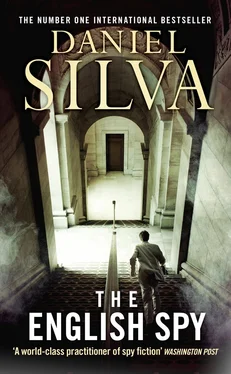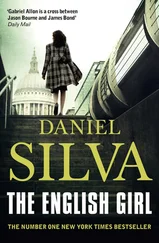Keller was bound, gagged, hooded, and bundled into the boot of a car. It took him from the slums of West Belfast to a farmhouse in South Armagh. There he was taken to a barn and beaten severely. Then he was tied to a chair for interrogation and trial. Four men from the IRA’s notorious South Armagh Brigade would serve as the jury. Eamon Quinn would serve as the prosecutor, judge, and executioner. He planned to administer the sentence with a field knife he had taken from a dead British soldier. Quinn was the IRA’s best bomb maker, a master technician, but when it came to personal killing he preferred the knife.
“He told me that if I cooperated, my death would be reasonable. If I didn’t, he was going to cut me to pieces.”
“What happened?”
“I got lucky,” said Keller. “They did a lousy job with the bindings, and I cut them to pieces instead. I did it so quickly they never knew what hit them.”
“How many?”
“Two,” answered Keller. “Then I got my hands on one of their guns and shot two more.”
“What happened to Quinn?”
“Quinn wisely fled the field of battle. Quinn lived to fight another day.”
The following morning the British Army announced that four members of the South Armagh Brigade had been killed in a raid on a remote IRA safe house. The official account made no mention of a kidnapped undercover SAS officer named Christopher Keller. Nor did it mention a laundry service on the Falls Road secretly owned by British intelligence. Keller was flown back to the mainland for treatment; the laundry was quietly closed. It was a major blow to British efforts in Northern Ireland.
“And Elizabeth?” asked Gabriel.
“They found her body two days later. Her head had been shaved. Her throat was slit.”
“Who did it?”
“I heard it was Quinn,” said Keller. “Apparently, he insisted on doing it himself.”
Upon his release from the hospital, Keller returned to SAS headquarters at Hereford for rest and recovery. He took long, punishing hikes on the Brecon Beacons and trained new recruits in the art of silent killing, but it was clear to his superiors that his experiences in Belfast had changed him. Then, in August 1990, Saddam Hussein invaded Kuwait. Keller rejoined his old Sabre squadron and was deployed to the Middle East. And on the evening of January 28, 1991, while searching for Scud missile launchers in Iraq’s western desert, his unit came under attack by Coalition aircraft in a tragic case of friendly fire. Only Keller survived. Enraged, he walked off the battlefield and, disguised as an Arab, slipped across the border into Syria. From there, he hiked westward across Turkey, Greece, and Italy, until he finally washed ashore in Corsica, where he fell into the waiting arms of Don Anton Orsati.
“Did you ever look for him?”
“Quinn?”
Gabriel nodded.
“The don forbade it.”
“But that didn’t stop you, did it?”
“Let’s just say I followed his career closely. I knew he went with the Real IRA after the Good Friday peace accords, and I knew he was the one who planted that bomb in the middle of Omagh.”
“And when he fled Ireland?”
“I made polite inquiries as to his whereabouts. Impolite inquiries, too.”
“Any of them bear fruit?”
“Most definitely.”
“But you never tried to kill him?”
“No,” said Keller, shaking his head. “The don forbade it.”
“But now you’ve got your chance.”
“With the blessing of Her Majesty’s Secret Service.” Keller gave a brief smile. “Rather ironic, don’t you think?”
“What’s that?”
“Quinn drove me out of the game, and now he’s pulling me back in.” Keller looked at Gabriel seriously for a moment. “Are you sure you want to be involved in this?”
“Why wouldn’t I?”
“Because it’s personal,” replied Keller. “And when it’s personal, it tends to get messy.”
“I do personal all the time.”
“Messy, too.” The shadows had reclaimed the terrace. The wind made ripples upon the surface of Keller’s blue swimming pool. “And if I do this?” he asked. “What then?”
“Graham will give you a new British identity. A job, too.” Gabriel paused, then added, “If you’re interested.”
“A job doing what?”
“Use your imagination.”
Keller frowned. “What would you do if you were me?”
“I’d take the deal.”
“And give up all this?”
“It isn’t real, Christopher.”
Beyond the rim of the valley a church bell tolled one o’clock.
“What am I going to say to the don?” asked Keller.
“I’m afraid I can’t help you with that.”
“Why?”
“Because it’s personal,” replied Gabriel. “And when it’s personal, it tends to get messy.”
There was a ferry leaving for Nice at six that evening. Gabriel boarded at half past five, drank a coffee in the café, and stepped onto the observation deck to wait for Keller. By 5:45 he had not arrived. Five additional minutes passed with no sign of him. Then Gabriel glimpsed a battered Renault turning into the car park and a moment later saw Keller trotting up the ramp with an overnight bag hanging from one powerful shoulder. They stood side by side at the railing and watched the lights of Ajaccio receding into the gloom. The gentle evening wind smelled of macchia , the dense undergrowth of scrub oak, rosemary, and lavender that covered much of the island. Keller drew the air deeply into his lungs before lighting a cigarette. The breeze carried his first exhalation of smoke across Gabriel’s face.
“Must you?”
Keller said nothing.
“I was beginning to think you’d changed your mind.”
“And let you go after Quinn alone?”
“You don’t think I can handle him?”
“Did I say that?”
Keller smoked in silence for a moment.
“How did the don take it?”
“He recited many Corsican proverbs about the ingratitude of children. And then he agreed to let me go.”
The lights of the island were growing dimmer; the wind smelled only of the sea. Keller reached into his coat pocket, removed a Corsican talisman, and held it out to Gabriel.
“A gift from the signadora .”
“We don’t believe in such things.”
“I’d take it if I were you. The old woman implied it could get nasty.”
“How nasty?”
Keller made no reply. Gabriel accepted the talisman and hung it around his neck. One by one the lights of the island went dark. And then it was gone.
TECHNICALLY, THE OPERATION UPON WHICH Gabriel and Christopher Keller embarked the following day was a joint undertaking between the Office and MI6. The British role was so black, however, that only Graham Seymour knew of it. Therefore, it was the Office that saw to the travel arrangements, and the Office that rented the Škoda sedan that was waiting in the long-term parking lot at Dublin Airport. Gabriel searched the undercarriage before climbing behind the wheel. Keller slid into the passenger seat and, frowning, closed the door.
“Couldn’t they have got something better than a Škoda?”
“It’s one of Ireland’s most popular cars, which means it won’t stand out.”
“What about guns?”
“Open the glove box.”
Keller did. Inside was a Beretta 9mm, fully loaded, along with a spare magazine and a suppressor.
“Only one?”
“We’re not going to war, Christopher.”
“That’s what you think.”
Keller closed the glove box, Gabriel inserted the key into the ignition. The engine hesitated, coughed, and then finally turned over.
“Still think they should have rented a Škoda?” asked Keller.
Gabriel slipped the car into gear. “Where do we start?”
Читать дальше












